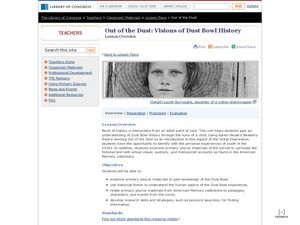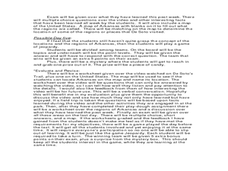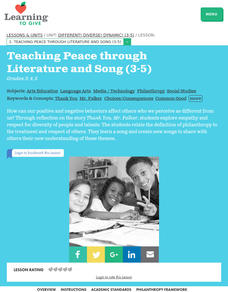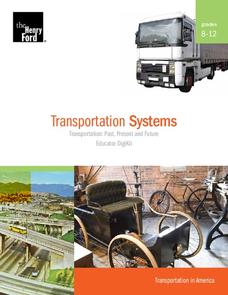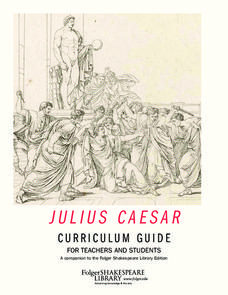Facing History and Ourselves
California Grape Workers’ Strike: 1965–66
The California grape workers' strike of 1965-66 is the focus of a lesson that asks high schoolers to investigate the strategies farmworkers used to organize and gain contracts with grape growers that ensured higher waters and better work...
Facing History and Ourselves
The 1968 East LA School Walkouts
The East LA School walkouts are the focus of a lesson that looks at the importance of an education that honors the culture of all learners. Class members watch videos and read an article on the LA student demands to gather background...
Facing History and Ourselves
Finding Your Voice
To begin a study of what it means to be American, high schoolers first consider their own identities. They draw a picture of what they think an American looks like and share their images. Next, they examine an image of the "Flag of...
Facing History and Ourselves
Identity and Choices
Timshel! Thou mayest! is the big idea in a lesson that reminds learners that they have choices about how they present themselves to others. To begin, individuals rate the degree to which the choices they make each morning are influenced...
Overcoming Obstacles
Problem Solving at Home
The final lesson in the "Problem Solving Module" focuses on finding creative solutions to problems that might arise at home. Individuals then create a storyboard that illustrates how they would apply the six-step problem-solving process...
Facing History and Ourselves
Maintain and Modify
Maintain or modify? That's the question scholars answer as they reflect on their focus and engagement in that day's lesson. Were learners focused and contributing, or do they need to modify their level of participation?
Facing History and Ourselves
What's In a Name?
Rumpelstiltskin understood the power of names. The second lesson in the First Days of School series focuses on building community by recognizing the importance of the relationships among names, identities, and cultures. Learners engage...
Curated OER
Using Information Resources: Lesson 1
Eighth graders examine, brainstorm, cluster, and skim how to use a variety of information resources to assist them in projects or reports. In addition, places to find those information resources as well as the parts of a book is covered...
Curated OER
Tomas and the Library Lady
Students practice read aloud comprehension strategies. In this literacy comprehension lesson plan, students listen to Tomas and the Library Lady, stopping to discuss with a partner aspects of the story suggested by the teacher. Students...
Curated OER
ToxMystery Lesson Plan 2 : Case Book: Catch That Hazard!!!
Students explore toxic hazards. In this personal health lesson, students discover appropriate uses for household chemicals as they identify potentially harmful products in their homes.
Curated OER
Railroad Idioms Art Lesson Plan
Sixth graders research railroad idioms. In this idiom lesson, 6th graders read through a glossary of different railroad idioms and their meanings. They illustrate a chosen idiom.
Curated OER
Out of the Dust: Visions of Dust Bowl History Lesson Overview
Students complete activities with the book Out of the Dust by Karen Hesse. In this literature lesson, students read this story and view the Dust Bowl history from the eyes of a child. They discover the Great Depression and life in the...
Curated OER
Self-Portrait Unit - Lesson #1
Fourth graders create self-portraits using artistic elements found in Hispanic culture and, specifically, the art of Frida Kahlo. The lesson can be adapted for any culture/country and requires an outside person with cultural knowledge.
Curated OER
Arkansas History Lesson Plant One: Play-Do Soto
Fifth graders complete a variety of projects to learn about Arkansas history. In this Arkansas lesson plan, 5th graders go on a field trip to a state park, explore an Arkansas map, put play-dough on the trail of De Soto, color regions of...
Curated OER
Action Verb Lesson
Second graders become familiar with action verbs through the reading of To Root, To Toot, to Parachute: What is a Verb? In this action word lesson plan, 2nd graders analyze sentences for the action verb. Students watch a video and...
Curated OER
Conservation at a Crossroads Lesson 1: What Is Conservation and Why Does It Matter?
High schoolers explore the concept of conservation. In this conservation instructional activity, students read articles and primary documents about the Conservation Movement in the United States and compare the movement to today's...
Curated OER
Different! Diverse! Dynamic! Lesson 2: Teaching Peace Through Literature And Song
Learners investigate bullying and discrimination and draw pictures of a personal response to being bullied. They read Thank You, Mr. Falkner by Patricia Polacco, to determine the philosophic act that the main character performs. They...
Curated OER
Lesson 1 - What Are Fossils?
Students define and research fossils. In this fossil lesson, students access teacher assigned Internet sites to examine images of fossils. They determine the definition of a fossil and find out how fossils are formed. They also define a...
Curated OER
Planning a Railroad Online Lesson
Students design a train route using a topographical map. In this historical and spatial thinking lesson plan, students must plan a route through the Sierra Nevada mountains that a train could physically travel. Links to printable student...
Henry Ford Museum
Transportation Systems
Learners analyze the evolution of cultural attitudes through the lens of transportation, examining several artifacts, documents, and photographs. Topics covered include how American attitudes have influenced society's evolution into a...
Everett Public Schools
High School Writing: Student Guide
Here's an amazing writing guide that deserves a place in your curriculum library. The 136-page packet provides focus lessons on the writing process, expository, persuasive, and timed writing, the Cornell system of note taking, and more....
Core Knowledge Foundation
Native Americans Tell It Again!™ Read-Aloud Anthology
A 154-page anthology explores the life, culture, and history of Native Americans. Eight lessons follow the routine of introducing the reading, conducting the reading, discussing it, doing word work, then taking part in an extension...
Folger Shakespeare Library
Julius Caesar Curriculum Guide
Julius Caesar need not be Greek to kids. The background information and suggestions for teachers, as well as the activities for learners, make this curriculum guide a must-have for your Shakespeare curriculum library.
Humanities Texas
Primary Source Worksheet: Franklin D. Roosevelt, Excerpts from Fireside Chat on Economic Conditions
Franklin D. Roosevelt's April 14, 1938 Fireside Chat on economic conditions provides young historians an opportunity to polish their primary source comprehension skills. A great resource to add to you curriculum library.
Other popular searches
- Fifth Grade Library Lessons
- Library Lessons K 2
- Elementary Library Lessons
- Library Lessons & November
- Kindergarten Library Lessons
- Library Lessons Grade
- Library Lessons for Preps
- Halloween Lessons Library
- Teks Library Lessons
- Library Lessons on Blogs
- Third Grade Library Lessons
- Library Lessons Grade 7













